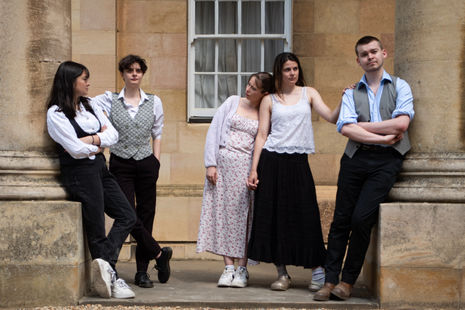1816: the year they wrote a musical
Daisy Bates sits down with the writers of the Fringe-bound musical 1816: The Year Without a Summer, ahead of its Camden run

Each summer, the Cambridge University Musical Theatre Society (CUMTS) sends two original shows to Fringe, one to Camden, one to Edinburgh. Writing one of these musicals is a prestigious opportunity – it’s not uncommon for a CUMTS show to take home best musical at its respective festival, and it was in this same slot that Six (yes, that one) was first performed. Sitting down for a Teams call with the writers of 1816: The Year Without a Summer, ahead of its Camden run, I’m curious: how’s the pressure? Nothing more than motivation, they assure me.
Writing a musical is no mean feat, but if there’s a more capable team than Nat Riches and Natasha Atkinson, I’m yet to see it. The two tell me that they’ve known each other since GCSE music, but it was after seeing the 2022 CUMTS musical on a trip to the Edinburgh Fringe that the pair decided to write together. Though they began the project that summer, it went on hold until last Michaelmas. “Once we got the slot,” Nat tells me, “we decided ‘we’re going to do it and we’re going to do it properly.’ It’s been a long time coming, but it’s come together really quickly.” I ask them whether they feel their shared history has benefitted their working relationship, and Natasha asserts that “not only have we known each other since school, but we’ve seen our styles develop since then. We have a good sense of each other’s strengths, and I think we’re really good at giving each other feedback. There’s no ego in the way.”
“Sometimes it’s like, are we writing these characters or are we learning from them?”
Using Polidori’s diary as a primary source, 1816 depicts the events of the summer where writers Percy and Mary Shelley, Byron, and their friends, searched for inspiration by Lake Geneva while trapped indoors by torrential rain. It’s a story about creation, and I ask the writers whether seeing their process mirrored in that way has been cathartic. Natasha laughs: “definitely. Sometimes it’s like, are we writing these characters or are we learning from them?” Nat adds that “we found so many parallels with our own lives – I mean, Mary Shelley’s struggle to prove herself in that group is so relatable.” Aptly, it was writing Mary’s solo, Frankenstein, that proved the biggest challenge for Nat: “I had writers’ block, and did the bulk of the writing while actually snowed into my house! It all felt deeply relevant.”
Fringe restrictions limit performances to an hour-long slot, and condensing a whole summer into a punchy musical requires ruthless editing. “We’ve approached the general arc of the summer pretty much entirely as it happened,” says Nat. Taking inspiration from composers from Mozart to Rachmanioff, the pair have written a score to reflect the shifting moods and tones of the summer. “The overture is fun, light but a little dramatic, with a Romantic theme inspired by Beethoven,” Natasha explains. “As the show goes on,” Nat adds, “the tension rises, people start arguing, everyone’s trying to write their own story. We definitely drew more on that romantic, emotional tension. In the later half, there’s a heavy bass and fast rhythms which get across the urgency and chaos. I think that contrasts really well with earlier in the show, when everything’s a little lighter.”
“Everyone has something to say, so say it and see where it goes”
It’s during this conversation that I learn Nat was a Natsci, and Natasha studied Law – hardly the most conventional subjects for co-writers of a musical. “I really think it can come from anyone so long as you believe in the story you want to tell,” Natasha insists, “because it’s the story that leads you. It was like, whatever skills we needed to develop, we’d do it because we have a strong feeling of what the end product should look like.” Nat adds that: “It’s about practice and commitment and not giving up. Everyone has something to say, so say it and see where it goes. For us, that’s led us here, which is amazing.”
With Fringe fast approaching, I ask what they hope audiences will take away from the show. “I’d like them to see how relevant Romanticism could be in the modern day,” says Natasha, “that approach to honouring the arts when you’re surrounded by a changing and confusing world.” “We just want the audience to connect with these people,” Nat continues, “not just as literary legends, but as the complicated and quite flawed human beings they were.” After thanking them both for their time, I have one more question: any plans for the show after Fringe? “The way I see it,” says Natasha, “there’s no limit on the show – it’s just a case of, like, how good can we make it?”
1816: The Year Without A Summer is showing at the Theatro Technis at Camden Fringe from 6th-7th of August, before runs in London and the Corpus Playroom
 News / Right-wing billionaire Peter Thiel gives ‘antichrist’ lecture in Cambridge6 February 2026
News / Right-wing billionaire Peter Thiel gives ‘antichrist’ lecture in Cambridge6 February 2026 Features / From fresher to finalist: how have you evolved at Cambridge?10 February 2026
Features / From fresher to finalist: how have you evolved at Cambridge?10 February 2026 Film & TV / Remembering Rob Reiner 11 February 2026
Film & TV / Remembering Rob Reiner 11 February 2026 News / Churchill plans for new Archives Centre building10 February 2026
News / Churchill plans for new Archives Centre building10 February 2026 News / Epstein contacted Cambridge academics about research funding6 February 2026
News / Epstein contacted Cambridge academics about research funding6 February 2026










